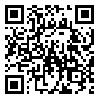BibTeX | RIS | EndNote | Medlars | ProCite | Reference Manager | RefWorks
Send citation to:
URL: http://jrh.gmu.ac.ir/article-1-835-en.html
Nowadays, body dissatisfaction and disturbed body image is very common among communities, especially women and adolescents. The aim of this research was to determine the effectiveness of cognitive-behavioral group therapy on disturbed body image and body dysmorphic disorder among high school girl students.The design of this study was quasi-experimental research with pretest -post test with control group and follow- up period. A sample include 27 individual who were selected with available sampling method (volunteer) of one of the high schools. Then, the subjects were divided in two groups experimental Group (n= 14), and control Group (n= 13) and assigned in two experimental and control group and were tested by Fisher Body Image questionnaire and Modified Yale- Brown Obsessive-compulsive Scale for body dysmorphic disorder. Then, experimental group received 8 session of cognitive- behavioral therapy techniques and control group not received any treatment. In the end, information from both groups recollected and Follow-up tests were performed two month after the intervention. Data analyzed with Spss-18 software and Multivariate Analysis of Covariance.The findings showed that disturbed body image and body dysmorphic disorder was a significant difference between experimental and control group, in post-test and follow up.This Results study showed that cognitive-Behavioral group therapy is effective in decreasing disturbed body image and body dysmorphic disorder for high school girls. Therefore, it is suggested mental health professionals must be considered to implement and sustain these programs.
Received: 2014/08/12 | Accepted: 2014/10/12 | Published: 2015/09/14
| Rights and permissions | |
 |
This work is licensed under a Creative Commons Attribution-NonCommercial 4.0 International License. |





